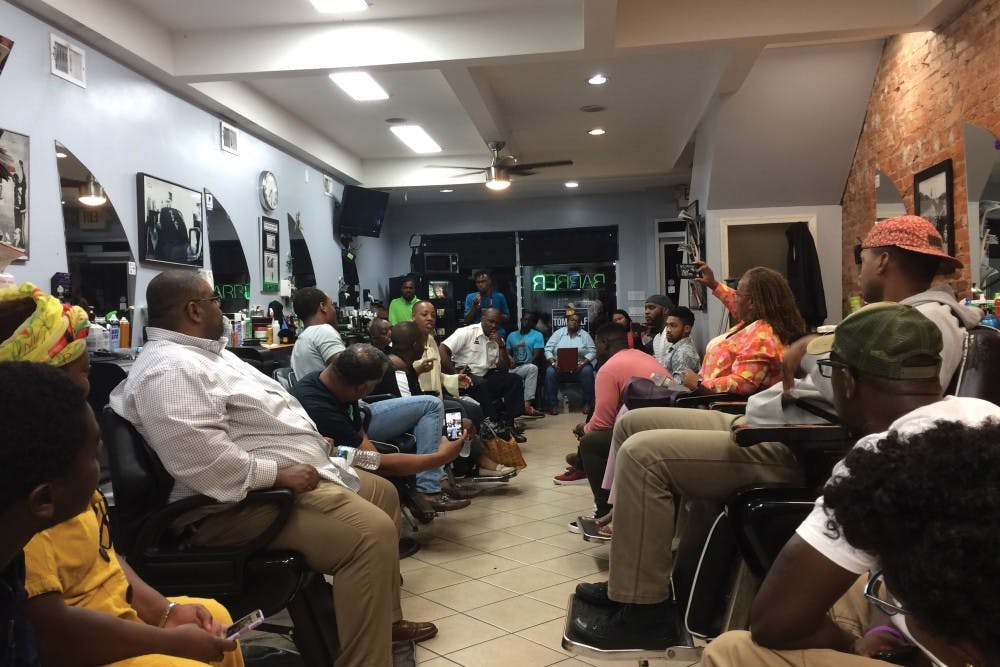In the West Philadelphia neighborhood situated just beyond the "Penn bubble" on 40th Street, police officers and community residents say tensions between them often run high. But at a barber shop only a few blocks off campus, Philadelphia police officer and Vice President of the National Black Police Association G. Lamar Stewart is working to bring the community together and bridge the divide.
Stewart joined his colleagues and local West Philadelphia residents inside the Philly Cuts barber shop at 4409 Chestnut St. at 6 p.m. Monday night for an event titled “Blades, Fades, and Engage.” During the meeting, which is held on the third Monday of each month, attendees discussed issues that cause and are caused by the fraught police-civilian relationships throughout the community.
Attendees raised issues including racial profiling, the need for community engagement, and the dangers and struggles of being a young black man in Philadelphia.
Deputy Sheriff Malika Rahman was a prominent participant in Monday's event. Speaking from her experience as a black woman on the force, Rahman pointed to the disparity between policing methods employed in rich and poor communities.
“Your training officer told you that, ‘Down there, they’re different, down there, you have to handle them a certain way or they won’t respect you,'” Rahman said. “It’s that fear of the black man that is instilled in [police officers] when they’re in training that we all know exists but we can’t confront.”
Rahman criticized the apparent differences in police practices when addressing law enforcement of drug use in different communities.
These differences in police approach particularly manifest at the edge of college campuses, Philadelphia police officer Mike Brown said. He spoke at the meeting about his experiences with the inequality between college campuses in Philadelphia and their surrounding regions.
“In a college area, we walk up to one house and I promise you there were probably about 500 students in the house drinking, smoking, getting high, but all white,” Brown said. “When it’s up there where it’s a little safer, it’s, ‘Move it along, you go back to school, mommy and daddy might hear about this later on, but you go back and get your degree and get your education.' And then they do the same thing next week.”
RELATED:
After working for three months without a contract, Penn Police union head says 'morale is horrible'
Growing number of Penn students are sent to serve community service sanctions off-campus

As the meeting progressed, several officers and community members suggested ways to help mend the strained relationship between West Philadelphia and its police officers.
One possible solution was offered by Officer Justin Harris, who suggested that he and his colleagues had a responsibility to move beyond simply patrolling and policing neighborhoods struggling with poverty and crime. Harris said officers should take a more active role to communicate with and help community members.
“We’re just moving a problem instead of fixing it,” Harris said. “Instead of telling them to move, I’d like to tell them to move where.”
Stewart, one of the main organizers of the monthly meetings and the divisional community relations officer for the southwest Police Division, said that the need for community engagement is not limited to his fellow officers. While he emphasized the need for black men specifically to confront bias and injustice, Stewart said that everyone, including Penn students, can help overcome these deeply entrenched problems.
“What we’re up against is something that’s systemic,” Stewart said. “This level of progressive thought, initiative, and work will also require the community to come to bat and have the back of officers, who are particularly African Americans, but even some of our non-African American allies.”
Stewart added that this need for support extends to college campuses such as Penn. In an interview with The Daily Pennsylvanian, Stewart said that although he appreciated Penn’s community outreach programs, he encouraged students and administrators to do more — to burst the 'Penn Bubble' and become part of greater communal change.
“Penn can help by participating in the conversation,” Stewart said. “Those who are here and who are native West Philadelphians, they’ll feel like Penn is not just trying to take over our community, but they’re very much connected to us […] they’re not trying just to push us out, but also join in.”









